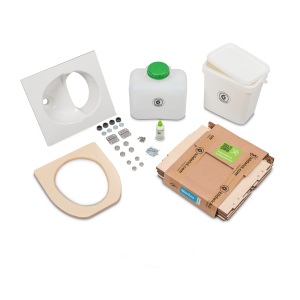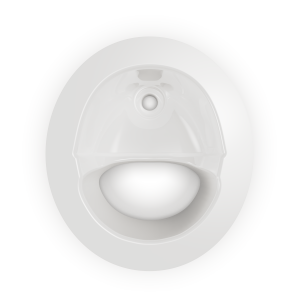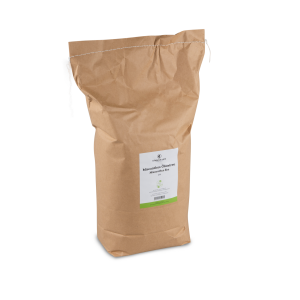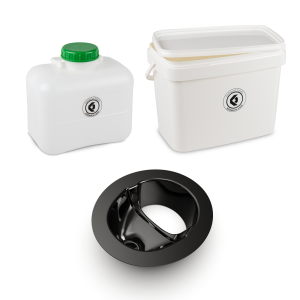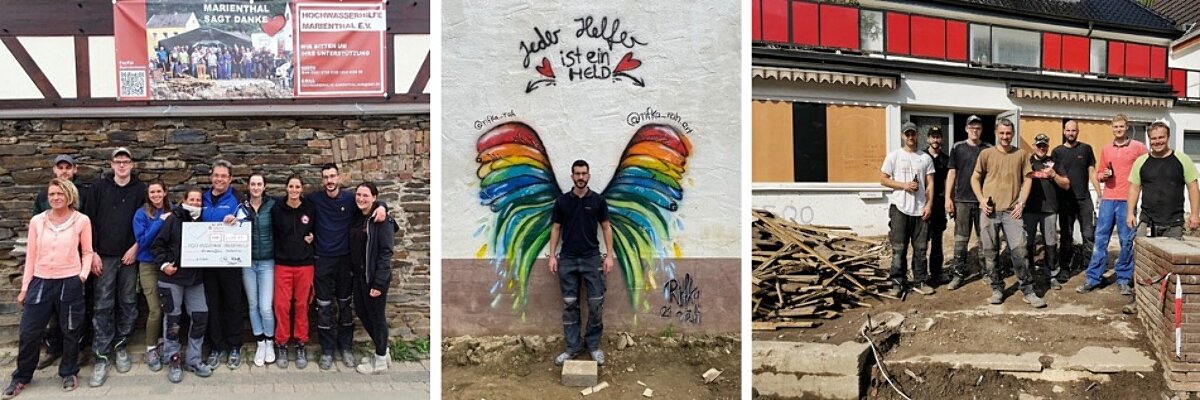Helping out in Ahrweiler - directly after the flood disaster and during the Christmas season. Our conversation with a naturally helping person.
Dear friends,
We hope you had a peaceful holiday season, which is now coming to an end. In the last hours of the holiday season, we would like to look back with you and think of the people who may not have had such a good Christmas this year, namely because they lost their homes or, even worse, relatives or friends in the flood disaster in Ahrweiler.
It is not about feeling bad, but about not forgetting others.
In view of these events, we ask ourselves what people need most in such a crisis that will last for a long time? Apart from the necessities of life, it is other people.
People who empathise, people who listen, but also people who lend a hand, help, sometimes with simple solutions, to get through the difficult time and create rays of hope - so that those affected can see: It goes on and we are not alone.
We have interviewed one of these impressive people, a "fellow packer" and listener. Read here what Steffen tells us about his work in Ahrweiler and how you can help the families in Ahrweiler, too.
Hello dear Steffen, we are very happy to talk to you. Tell us: Crisis situations always mean a certain dependence on state aid and solidarity. What were your experiences here?
For me, the most important thing is cohesion and the formation of a community, because situations like this can only be overcome as a team. The first time I was on site was three weeks after the flood, when the basic supplies of food, drinks and toilets had already been provided.
It was and is truly remarkable what private organisations in particular were able to put together in a very short time.
It was different with the electricity and water supply, here we had to rely on provisional solutions. What I underestimated was the problem of communication. Many of those affected were unable to reach their friends and families in neighbouring villages for days, the telephone network collapsed and the roads were impassable due to the metres of water that had washed up. In many places, roads were even completely washed away.
For me, it is unimaginable not to know how our loved ones are doing after days.
In the course of this flooding, most of the sanitary facilities were destroyed. As a result, many people no longer had their own toilet. Wouldn't dry separation toilets be a comfortable solution there?
This is an interesting coincidence in my case. I actually asked myself this question for the first time in the Ahr valley, but long before the flood disaster. In April of this year, I planned a short holiday to the Ahr Valley. All hotels, holiday flats and campsites were closed due to the pandemic.
To finally get out and enjoy nature, I didn't mind.
I packed my VW T3 camper and wanted to start. Until then, it had worked fine without a toilet. If you asked nicely, you could use the toilet in many shops or restaurants. Due to regulations, this was not possible in April and a solution had to be found.
Through various social media channels, I became aware of the different toilet concepts and quickly realised that it shouldn´t be a "chemical toilet".
I couldn't quite imagine the function of a dry separation toilet, but then relied on the positive opinions on the internet. Since the first use, all doubts were gone and I was surprised how well it works.
I wouldn't set off without it today.
Can you imagine dry separation toilets as a permanent solution?
Since then, however, I have always asked myself why we flush our toilets with water, in order to filter it out again later, or why we use such a chemical mace in mobile or camping toilets. Dixis have been set up in all the villages in the Ahr valley, which is of course not always pleasant.
A toilet of one's own is currently a rare luxury there.
I believe in normal households, the toilet with water and sewage connections has become the norm. But especially in remote gardens or when camping, the dry separation toilet can and should be more widespread. What I keep noticing is that many people are not aware of this toilet concept and generally do not talk openly about the subject.
Most of us have never been a helper at a disaster site. How did you feel when you returned home?
First and foremost, many hands are still needed on the ground, so I can only urge everyone to lend a hand there. I can say from my own experience that no one will regret it. I met wonderful people in Ahrweiler, both helpers and those affected.
My view of humanity changed a lot there, everyone still has positive mindset and without prejudice.
With common will to create something and to help the other person. None of us would have dared to do what we did on those days. In the meantime, we have become a large group that meets again and again on site. The saying "Came as strangers, left as friends" fits us very well.
For all of us it is always clear that we will be back! With the aim of lying in each other's arms over a nice glass of wine and seeing what we have created. I am sure that Ahrweiler will be more beautiful than ever before, even if a little different.
Steffen, Christmas time means thinking of others too: what can you do to express your solidarity with the people of Ahrweiler?
I am now on site every weekend to help. Very special friendships have developed.
In the last few weeks, a Christmas party was organised for the residents - many X-mas trees were put up. A fortnight ago, we made the first flat ready to move in: doors were installed, walls plastered, screed poured, firewood delivered. At the moment, a new roof is being put on. Our team is helping out everywhere. In the meantime, we also have experts in the team.
Every helping hand is welcome, but of course it is not possible for everyone.
If you still want to contribute and give the families in Ahrweiler a Christmas present, you have the opportunity to participate in the relief action of the roof tent nomads - also esteemed members of the Kildwick community who are actively involved on site.
To sweeten Christmas and the joyful prospect of a new beginning for those who are not sitting snugly within their four walls like we are, but are still waiting for a new home.
Steffen, we would like to thank you very much for the interesting interview and express our admiration for your commitment. We wish you good luck and a Merry Christmas!
